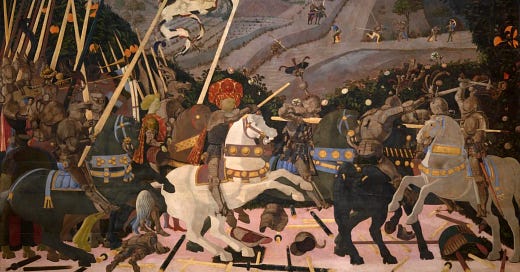Winning on the Battlefield is Not Enough
Military analyst and author David Kilcullen says Russia and China are challenging the West by changing the definition of war
The West, led by the United States, is being forced to transition from a post-Cold War world in which it enjoyed unrivaled military, political, and economic dominance to one where Russia is resurgent and China has risen to great power status. And these changes are coming after decades in which the national security focus of America and other Western nations has been on counterterrorism and counterinsurgency rather than great power competition.

Given these new realities, the West needs a new military and geopolitical strategy, says David Kilcullen, president and CEO of the strategic research firm Cordillera Applications Group, Inc., and a global security professor at Arizona State University. Kilcullen says that David Kilcullen, global security professor at Arizona State University and author of "The Dragon and the Snakes"traditional conventional military superiority is no longer enough for the US and its Western allies to ensure continued dominance. That’s because Russia, China, and lesser powers, such as Iran and North Korea, have learned how to pursue national goals in the face of potentially superior opposition by studying the Western ways of war and adapting their weapons, doctrine, and strategies accordingly.
“The Gulf War showed everybody how not to fight us,” Kilcullen says.
After the storm
In hindsight, 1991 proved to be a watershed in the history of modern warfare. That year, US-led coalition forces attacked and quickly routed Saddam Hussein's Iraqi forces, which had themselves rapidly invaded and seized Kuwait less than six months earlier. During Operation Desert Storm, Western airpower effectively dismantled Iraq’s French-designed and Soviet-equipped integrated air-defense network. It was a prelude to an air-land campaign marked by lopsided tank battles and burned-out wrecks strewn along the so-called Highway of Death leading out of Kuwait and back to Iraq. When it was over, the US and its allies had won a complete and total victory, liberating Kuwait and, in the process, destroying Hussein’s military.
It was a hard lesson for many. As then US President George H.W. Bush conceived of a “new world order” in the afterglow of victory, military planners in the nascent Russian Federation and China wrestled with the realization that nearly all of their deployed weapon systems and trained formations had virtually no chance of standing up to those of the US and the West in a pitched battle.
Now, nearly 30 years later, the West is dealing with the results of the reforms Russia and China set into motion in the aftermath of the Gulf War. In his latest book, “The Dragon and the Snakes: How the Rest Learned to Fight the West,” Kilcullen describes nation-state opponents that field conventional armed forces—the dragons—and rogue states and non-state organizations that use asymmetric means of waging war—the snakes.
“It’s a bit of a cliché in military innovation to say that when we adopt a dominant approach, other people will seek to offset that by coming out with asymmetric approaches,” Kilcullen says, referring to strategies and technologies that circumvent rather than match the dominant power’s capabilities. “Rather, other powers are coming up with combination approaches. Both the Russians and the Chinese are seeking to compete directly with us in a conventional sense in areas where we are strong while developing nonconventional capabilities to blunt our approach until they are ready.”
For example, China is deploying a powerful navy with aircraft carriers, modern surface ships, and attack submarines bolstered by an array of advanced strike, air-defense, and anti-ship missiles to deny US forces access to the Western Pacific. It is building up rocks and reefs in the South China Sea to establish bases and press territorial claims. Russia has embarked on streamlining and modernizing its land and tactical air forces, first prompted by a series of bloody conflicts in Chechnya in the 1990s and accelerated in the wake of a successful but clumsy assault on the independent Republic of Georgia in August 2008.
According to Kilcullen, both of these “dragons” are combining military reforms and new weapons technologies with strategies to circumvent Western battlefield dominance. These strategies aim to advance national strategic goals—sometimes using military power—without triggering a Western military response.
Powers of perception
Kilcullen describes two nonconventional strategies that characterize how major powers like Russia and China advance their agendas, often at the expense of Western interests. One of these strategies, “liminal warfare,” can be envisioned as a vertical series of increasingly more energetic and observable actions, from clandestine activity at the bottom to open conflict at the top. The other, “conceptual envelopment,” can be characterized by a horizontal spectrum of small challenges and areas of competition that expand beyond an adversary’s ability or even inclination to respond. The purpose of each is to apply pressure while sowing disinformation, leaving the West in doubt about whether it is experiencing a conflict at all until it is too late to do anything about it.
A country that uses a liminal strategy seeks to manage an opponent’s ability to both detect an activity and attribute it to a particular sponsor. And if done successfully, it also allows the country to blunt an opponent’s ability to effectively respond. Kilcullen says that Russia uses this strategy when it faces relatively well-armed adversaries that are politically and legally constrained in their range of responses. Furthermore, a successful operation need not remain undetected forever, just long enough to become a fait accompli. Russia performed such political obfuscation when it seized the Ukrainian territory of Crimea in February 2014 under the guise of a humanitarian operation. By the time Ukraine and its Western allies realized what was happening, Crimea was firmly under Russian control.
“The Russians have realized that in a modern social media environment where everybody has a cell phone and you have websites like Bellingcat that you can’t keep anything secret,” Kilcullen says. “So they are not trying to keep anything permanently secret. What they are trying to do is keep their actions temporarily ambiguous so that they can move quickly, seize their objectives, and consolidate before we can respond.”
Kilcullen speculates that Russia’s alleged attempt to disrupt the 2016 US election was not intended to affect its outcome but to sow dissention and paralyze decision-makers while it engineered offensives in Syria in December 2016 and January 2017, and in the eastern Ukrainian region of Avdiivka, also that January. If so, the Russians succeeded beyond their wildest dreams: the results of the relatively inexpensive disinformation effort continue to reverberate through US politics. Such operations press at the seams of the target’s society, occupying political, media, and bureaucratic bandwidth that is then unavailable to respond to quick military action in foreign lands.
“Russiagate and the Mueller Report and all that, distracts us from something we really should notice,” Kilcullen says. “The Russians deliberately integrate their political warfare into physical military maneuvers for the specific purpose of disrupting us and making it hard for us to achieve consensus, delaying any decision on our part so that their forces can consolidate on the ground.”
War without rules
If a liminal strategy suits Russia, with its relatively limited conventional forces but freer hand to use them, at least compared to its Western opponents, the conceptual envelopment strategy seems tailor-made for a much wealthier China, with its growing military and its willingness to take a long-game approach to achieve global power status. However, because the conceptual envelopment strategy is based in part on widening the definition of warfare, it runs a significant risk of miscalculation.
Kilcullen cites “Unrestricted Warfare,” a landmark book written by two senior colonels in China’s People’s Liberation Army (PLA) and published in 1999, as exemplifying much of the thinking inside China about how it should respond to US military dominance. The book broadens the definition of war to include “all means” to compel an enemy’s submission and that “non-war actions may be the new factors constituting future warfare.” Such factors may include financial disruption, trade wars, cyberwarfare, criminal activities, and the manipulation of rules and norms (i.e., lawfare).
While the book is not an official guide in the sense suggested by the lurid subtitle of the English-language edition—“China’s Master Plan to Destroy America”—Kilcullen says it is influential in official Chinese military and political circles and illustrates how seriously the PLA regarded and still regards the threat posed by the Western approach to war as demonstrated in the Gulf War. While mocking the “unrestrained battle banquet,” where US bombers were “flying mountains of gold, more costly than many of their targets,” the book’s authors stress the futility of fighting the US in a “symmetric,” force-on-force conflict.
“China engages in what I term ‘non-military’ or ‘trans-military’ war operations, which are designed to be hard to detect as military actions,” Kilcullen says, citing examples such as acquiring commercial port facilities and real estate in strategic areas outside China, making business investments abroad, participating in foreign 5G communications projects, achieving monopolies in strategic materials (e.g., rare earth metals vital to electronics manufacturing) and pharmaceutical supply chains, and even tolerating criminal trafficking of illegal fentanyl into the US, albeit not officially.
“We don’t define those elements as military, so we don’t see what we are seeing and conclude that we are in a warlike environment. Also, the strategy takes into account Western rules and bureaucratic structures so that even if we do recognize specific threats, we find it difficult to come up with an appropriate military response.”
One of the key challenges of the conceptual envelopment strategy is that it requires a deep understanding of an opponent’s perceptions and decision-making processes. Getting this wrong can lead to real dangers. Indeed, Kilcullen says, because China is treating so many traditionally non-military actions as military actions, it could easily misinterpret something the West regards as an aspect of peaceful competition (say, a trade dispute or an effort to re-shore certain industries) as a hostile act. When everything has potential military applications, any action may be considered an act of war.
The current world order, such as it is, exists because the West developed the rules and means to enforce them on the basis of its victory in World War II and in the subsequent Cold War. Kilcullen says the challengers of this order do not consider themselves in any way bound by its rules except as cover for their own efforts to subvert this order to their own benefit.
“There is an honorable tradition in the West of relying on rules and redlines to determine appropriate military responses,” he said, citing German Chancellor Angela Merkel and former US President Barack Obama as champions of this approach, which emphasizes reliability, consistency, and making clear pronouncements. Such a tradition, while intended to deter challenges to the existing order, offers opportunities to those very same challengers who play by their own rules. “The more predictable you are, the easier it is to be played.”
Kilcullen points out that the US and the West more broadly are not blameless in drawing such hostility, veiled or otherwise, from rival dragons. He cites the expansion of NATO eastward in the 1990s and the campaign to unseat and ultimately kill Muammar Qaddafi in Libya in 2011—both in the face of Western assurances to the contrary—as hardening Russian attitudes toward the West. China, he says, harbors grudges, such as the US bombing its embassy in Belgrade during the NATO air campaign against Yugoslavia in 1999. China does not accept US explanations that the bombing was an accident.
Nevertheless, if the West is to persevere in a world of energetic, adaptable dragons, Kilcullen suggests its decision-makers come out of their defensive, deterrent-dependent crouch and examine what rivals are actually doing, not what they are showing us and want us to see.
“We’ve had this attitude that all these bad guys are moving against us and we have to defend everywhere,” he says, adding that this is a recipe for collapsing faster. Instead, the West needs to see the game its rivals are playing and be willing to call them on it. Part of this is understanding that war does not always mean armed conflict. Sauce for the goose is sauce for the gander. “If we get offensive in a selective way, I think there are a lot of opportunities out there.”






